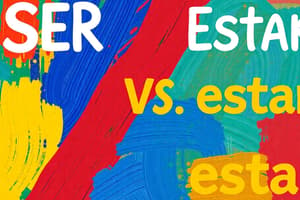Podcast
Questions and Answers
What does 'para' typically indicate when used before verbs?
What does 'para' typically indicate when used before verbs?
- In order to (correct)
- Duration of time
- Direction towards an endpoint
- For the sake of
Which of the following phrases indicates a means of transportation using 'por'?
Which of the following phrases indicates a means of transportation using 'por'?
- Viajo por avión (correct)
- Tengo que estar listo para las 4pm
- Este tren va para Castellón
- Voy para la casa
Which phrase correctly illustrates the use of 'por' to indicate a period of time?
Which phrase correctly illustrates the use of 'por' to indicate a period of time?
- Por la tarde
- Por dos horas (correct)
- Para las cinco
- Para un momento
How is 'por' used in the phrase 'Voy por la calle'?
How is 'por' used in the phrase 'Voy por la calle'?
What does 'por qué' translate to in English?
What does 'por qué' translate to in English?
In the example 'te cambio este por otro', what does 'por' signify?
In the example 'te cambio este por otro', what does 'por' signify?
Which statement about 'para' is incorrect?
Which statement about 'para' is incorrect?
What is the meaning of 'por molestar'?
What is the meaning of 'por molestar'?
What is the main purpose of distinguishing between por and para in Spanish?
What is the main purpose of distinguishing between por and para in Spanish?
Which of the following best describes the meaning of 'por'?
Which of the following best describes the meaning of 'por'?
How can 'para' be generally understood in relation to objectives?
How can 'para' be generally understood in relation to objectives?
What is the linguistic origin of the word 'por'?
What is the linguistic origin of the word 'por'?
In which context would you typically use 'para'?
In which context would you typically use 'para'?
Which of the following sentences correctly utilizes 'por'?
Which of the following sentences correctly utilizes 'por'?
Which interpretation best represents the use of 'por' in terms of time?
Which interpretation best represents the use of 'por' in terms of time?
What conceptual difference helps understand 'por' and 'para'?
What conceptual difference helps understand 'por' and 'para'?
Flashcards
Por (location)
Por (location)
A preposition in Spanish meaning 'through', 'across', or 'around' when referring to location.
Para (location)
Para (location)
A preposition in Spanish meaning 'towards' or 'to' when referring to location.
Por (time)
Por (time)
A preposition in Spanish indicating duration or a period of 'through' time.
Para (time)
Para (time)
A preposition in Spanish indicating a deadline or goal towards which time is moving.
Signup and view all the flashcards
Para (people/things)
Para (people/things)
A preposition in Spanish used for indicating the recipient or purpose of an action.
Signup and view all the flashcards
Por (people/things)
Por (people/things)
A preposition in Spanish used for indicating a reason or exchange for an action.
Signup and view all the flashcards
Pro (Latin root)
Pro (Latin root)
The Latin root word for 'Por'. Means 'for' or 'on behalf of'.
Signup and view all the flashcards
Visual Concept
Visual Concept
This key concept illustrates the distinction between 'Por' and 'Para' using a visual analogy.
Signup and view all the flashcards
Por (preposition)
Por (preposition)
Used for expressing "in exchange for" or "for the sake of."
Signup and view all the flashcards
Para (preposition)
Para (preposition)
Used to express direction, purpose, or deadline.
Signup and view all the flashcards
Por qué - why (meaning)
Por qué - why (meaning)
Use this when you are referring to the reason or cause of something.
Signup and view all the flashcards
Para qué - to do what? (meaning)
Para qué - to do what? (meaning)
Use this when you are referring to the purpose or goal of something
Signup and view all the flashcards
Por mí - because of me (meaning)
Por mí - because of me (meaning)
"Por mí" means "because of me". It focuses on the cause or reason.
Signup and view all the flashcards
Para mí - for me (meaning)
Para mí - for me (meaning)
"Para mí" means "for me". It focuses on the beneficiary or receiver.
Signup and view all the flashcards
Por Castellón (meaning)
Por Castellón (meaning)
"Por Castellón" means "going through Castellón". It describes the route or path.
Signup and view all the flashcards
Para Castellón (meaning)
Para Castellón (meaning)
"Para Castellón" means "going to Castellón". It indicates the destination or endpoint.
Signup and view all the flashcardsStudy Notes
Understanding Por and Para
- Key Difference: Por and para both translate to "for" in English, but they have distinct meanings. Por focuses on the means, cause, or duration, while para emphasizes the destination, purpose, or benefit.
Visualizing Por and Para
- Concept: Imagine a 3D model with location, time, and people/things axes. Por relates to movement through or along these aspects, while para ties to a specific endpoint or purpose.
- Location: Por suggests "through," "around," "across." Para emphasizes the destination.
- Time: Por represents duration ("for five days"). Para focuses on the time associated with an endpoint or goal ("for/by 4pm").
- People/Things: Por often conveys a means or cause ("in exchange for"). Para indicates benefit or purpose ("for the benefit of").
Key Uses of Por
- Means/Cause/Duration: Por signifies the means or cause, a transition or duration, like "through time," "in exchange for" and "due to" something.
- Direction ("through/along"): "Vamos por la calle" (We're going along the street).
- Periods of Time: "Por la noche" (At night/during the night), "Por la tarde" (In/during the afternoon).
- Duration: "Por 2 horas" (For 2 hours), "Por un momento" (For a moment).
- Agent (by): "100 años de soledad fue escrito por Gabriel Garcia Marquez" ("100 Years of Solitude was written by Gabriel Garcia Marquez").
- Transport: "Por avion" (By plane).
- "In exchange for": "Te cambio este por otro" (I'll change you this one for another).
- Following verbs: Por commonly follows verbs (e.g., "comenzar por," "preguntar por," "votar por").
Key Uses of Para
- Destination/Purpose/Benefit: Para relates to the goal, purpose, or benefit.
- Direction ("towards"): "Vamos para la casa" (We're going home).
- Following verbs (to): Para is used before verbs that express a goal ("Para llegar, tienes que tomar el bus" - in order to arrive, you have to take the bus).
- Time (endpoint): "Tienes que estar listo para las 4pm" (You have to be ready for/by 4pm).
- Expressing an opinion/preference: "Para mi, no es buena idea" (For me, it's not a good idea).
Distinguishing Por and Para
- Por qué/Para qué: Por qué ("Why?") relates to reason; para qué ("In order to what?") relates to purpose.
- Por mí/Para mí: Por mí ("Because of me") highlights the cause; para mí ("For me") implies a benefit or purpose.
- Location vs Destination: Comparing "Este tren va por Castellón" (This train goes via Castellón) with "este tren va para Castellón" (This train goes to Castellón), illustrates the difference.
Studying That Suits You
Use AI to generate personalized quizzes and flashcards to suit your learning preferences.




